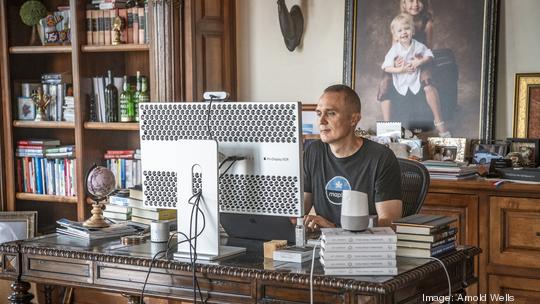
Data.world Inc. co-founder and CEO Brett Hurt always planned to certify the Austin company as a B corporation — which reflects a commitment to social and environmental goals beyond just profit-making.
Now that decision is paying off big time.
The startup Hurt co-founded in 2015 announced Sept. 15 it had closed a $26 million funding round — “which was significantly oversubscribed,” Hurt said — led by California-based venture capital firm Tech Pioneers Fund. New investors included Breyer Capital, Prologis Ventures and Alumni Ventures Group. Existing investors Shasta Ventures, OurCrowd and Workday Ventures also participated.
The round also included angel investors such as RetailMeNot Inc. founder and former CEO Cotter Cunningham; Arthur Patterson, founding partner at California-based venture capital and private equity firm Accel; and Kentucky-based social impact investor Lincoln Brown.
The company also announced that Tech Pioneers Fund Chairman Scott Booth and Sally Jenkins, chief marketing officer of open-source software maker Elastic NV, have joined its board of directors.
Data.world enables users to link, query, catalog and analyze disparate sets of data. And it hosts an open-data community where members upload statistics related to a wide range of topics, such as the Covid-19 pandemic, city crime, school attendance and fantasy sports.
“As one of the original investors in both Alibaba and Compass, I’ve seen how critical data is in driving company performance,” Booth said in a statement. “Data.world is changing the way enterprises think about and use data. It’s not simply for the data scientists and engineers, but for everyone in an organization.”
Hurt said in a statement that the company “raised most of our round after Covid-19 hit” and described the funding round as “a testament to our team’s performance and our ambitious mission to help our customers and the world become more data-driven.”
In an interview, Hurt said fundraising during the pandemic has been his greatest unexpected challenge.
“It’s hard to believe that almost 70% of our round was raised after SXSW cancelled its event in early March,” he said. “I didn’t travel for any of the fundraise. It was all done right behind my computer. That was a first, and I had to bring a lot of energy to each and every pitch.”
Data.world's funding underscored how companies in certain critical sectors, including those in Austin, continue to raise capital during the coronavirus. Insurance-tech startup Sana Benefits Inc. on Sept. 9 closed a $20.8 million round. On Aug. 28, biopharmaceutical company Triumvira Immunologics Inc. closed a $55 million series A round, the same day video-streaming startup Restream Inc. announced it had closed a $50 million series A funding round.
Among other things, the capital infusion will help Data.world “accelerate its agile data governance initiatives.” In a July post on the company’s website, co-founder and Chief Product Officer Jon Loyens described agile software as different from prior eras’ “top-down style development” of software, writing that it emphasizes “iterative, inclusive delivery ahead of elusive concepts like ‘completeness.’”
The new capital also will fuel the company’s continuing efforts to “scale to meet increased market demand for its enterprise platform,” according to the announcement.
Hurt, who previously led companies to a buyout (CoreMetrics, acquired by IBM) and an initial public offering (Bazaarvoice), had this to say about a potential exit for Data.world: “Our focus is on building a strong, high-growth enterprise company that competes at the highest levels. We believe we are doing that well and this fundraise — our fourth and largest round to date — is a reflection of that. … I couldn’t be more thrilled about our future, and it will be very interesting to see Snowflake, one of our partners, [execute an initial public offering] within the next few weeks. They are helping pave the way to the cloud-native data future that we’ve believed in since our beginning.”
Company background
Data.world’s latest funding round brings the total raised by the company to $71.3 million. The business closed an oversubscribed $12 million round in 2018 led by Workday Ventures.
Data.world's customers include The Associated Press, Prologis, WPP and Wunderman Thompson Data.
“We rely on Data.world to help our analysts and business leaders make data-driven decisions about real estate investments and global supply chain opportunities,” said Luke Slotwinski, Prologis Inc. (NYSE: PLD) vice president of data and analytics, in a statement. The San Francisco-based real estate investment trust invests in logistics facilities and had $3.3 billion in revenue in 2019.
The company’s “intuitive interface and powerful technology, including their knowledge graph, makes data discovery and exploration more accessible and immediately actionable to our business,” Slotwinski added.
Data.world also stands out with its B corp certification.
Breyer Capital founder Jim Breyer, a renowned investor who backed Facebook in 2005, in August told Austin Business Journal that the Texas capital’s culture is one “of giving back. It is a B Corp culture. Environmental sustainability really matters to the entrepreneurs of this generation. Austin can play a leading role in providing a model for companies reshaping capitalism going forward and driving change.”
Data.world’s culture and its mission to practice conscious capitalism were among the reasons Breyer chose to invest.
"I am thrilled to be investing in Data.world," Breyer, who in August opened an Austin office for his investment firm, said in a statement. "Breyer Capital is excited to back yet another top-notch company in Austin and we're thrilled that Data.world is a B Corporation. We are so excited by the company's unique vision and stellar team, combined with its exceptional performance.”
Hurt declined to share revenue figures but said, “despite the challenges of the global pandemic, Data.world saw new enterprise bookings in the first half of its current fiscal year grow by more than 100% year over year."
He said its number of enterprise customers has also grown by more than 1,900% this year compared with all of 2019. The company is not yet profitable and remains in growth mode.
Data.world employs 75 and Hurt plans to continue adding to his team, particularly to fill sales, customer and “product-side” positions, he said. The CEO highlighted that the company has added 28% of its full-time employees since the onset of the pandemic "and most have never stepped foot in our office.
"That’s tough for me since our office environment was a big part of our culture," Hurt said. "Luckily I’ve learned that culture is not about the place, but about the people and the mission. If you hire well, train well, and keep people motivated and excited, they’ll become high-performing contributors.”
Data.world’s Head of Talent Lisa Novak added that she “learned that we had to create moments for new employees to connect and learn what each other is responsible for and where their resources were. So we expanded orientation significantly and added a three-part series getting to know business unit leaders and dive further into their organizations."
Differentiation
Hurt said businesses in every industry are “not just siloed from a data perspective, they’re siloed from a people perspective."
Data.world's cloud-native enterprise data catalog “lights up” the locations of where data sit in customer companies — often revealing to their executives previously unknown existing data sets, or data sets that had been forgotten.
“Once you connect all that, it literally makes your company smarter,” Hurt said.
That has become particularly significant during the pandemic, when the business world “is changing at a faster rate than at any time since the Great Recession,” he said.
The company plans to launch products “in new verticals,” the CEO said. “We haven’t found one yet where our solution doesn’t work: media, real estate, tech, financial services, health care — literally every category has this universal problem of data silos.”
Another differentiator is Data.world’s ability to get its products and services up and running for its customers within hours or days in many cases, Hurt said.
“Investors have noticed,” he said. “I told our team at the beginning of the pandemic that we’ll really stand out if we can beat our goals in this industry.”
Prologis is among those who took notice, Hurt said. The company initially came to Data.world as a customer, after working with a competitor for about a year. That competitor failed to provided Prologis what it needed, Hurt said.
“We got them up and running in a few weeks — it took longer than days due to their unique situation,” he said. “They were blown away and asked if they could invest.”
Data.world competitors include IBM, Informatica and Alation, according to research and advisory firm Gartner Inc.
Office plans
Hurt has no plans to move his staff back to the company’s physical offices at 7000 North Mopac Expressway.
“I’ve said from the beginning of the pandemic that our No. 1 consideration is: Is it truly safe to get back together in person?” Hurt said. “Six months into this thing, we still don’t have drugs like the ‘Tamiflu of Covid-19,’ where if you get it, the symptoms are going to be mild. We still don’t understand why the coronavirus has such a major impact on some people [and not on others who contract the virus]. We don’t know enough to take that risk of going back into the office.”
To make things easier as Data.world employees continue to work remotely, the company paid movers for its workers who wanted any of their office furniture brought to their homes, the CEO said.
Hurt said he plans to continue to keep its physical offices and ultimately decide what to with that space “next year, based on how fall goes,” regarding the pandemic.
One surprising thing Hurt has learned about people working from home during the pandemic is that “people are working a lot more,” he said. “The reason is commutes have been cut out, people are not flying — the natural break points from working no longer exist. So it’s possible to pack so much more in a day.”
To protect Data.world employees from burnout, Hurt has implemented company-culture work break points. Examples include employees taking at least one day off a month from all work communication, “so they can recharge.” He also made Labor Day weekend a four-day holiday, rather than the traditional three-day one. He plans to do the same with the upcoming October Indigenous Peoples’ Day holiday weekend, also known as Columbus Day.







